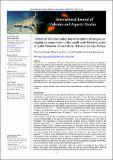| dc.contributor.author | T Otiende, E Ogello, A Ora, J Fonda | |
| dc.date.accessioned | 2022-01-21T13:26:25Z | |
| dc.date.available | 2022-01-21T13:26:25Z | |
| dc.date.issued | 2021 | |
| dc.identifier.uri | https://repository.maseno.ac.ke/handle/123456789/4474 | |
| dc.description.abstract | Lake Victoria is an integral part of Kenya's food production system. Fisheries policies and regulations
have been formulated and implemented for sustainable management of the lake's resources, but the lake's
ecological health continues to deteriorate. This study investigated the effect of fisheries policy
implementation strategies on regulatory compliance in the small-scale fisheries sector in Lake Victoria,
in Busia County, Kenya. A descriptive and explanatory research design was applied to a cross-section of
randomly selected 324 respondents. Findings from the study show that legitimacy was not significant in
compliance on closed seasons and mesh size regulations (p˃0.05). Examining the fishery's specific
conditions is required to debate the importance of non-recognized regulations, why this happens, and
how to strengthen the procedures to make them legal. The study further indicated that fishermen with
consistent income do not violate the regulations (p ˂0.05). Government commitment is thus required to
implement long-term alternative livelihood strategies to increase compliance with fisheries regulations. | en_US |
| dc.publisher | International Journal of Fisheries and Aquatic Studies | en_US |
| dc.subject | Fisheries policies, Lake Victoria, alternative livelihoods, compliance to regulations, Busia County | en_US |
| dc.title | Effects of fisheries policy implementation strategies on regulatory compliance in the small-scale fisheries sector in Lake Victoria: A case study of Busia County, Kenya | en_US |
| dc.type | Article | en_US |

